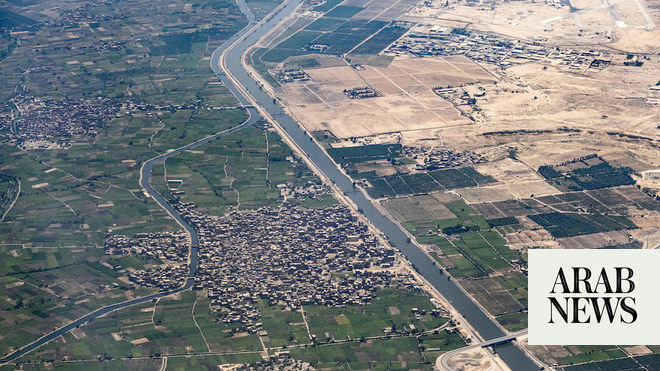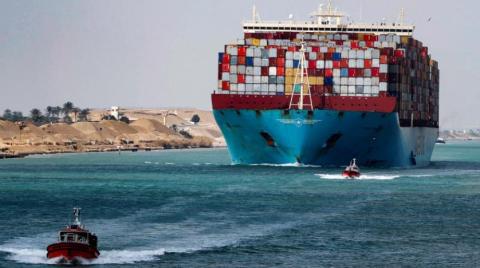
ISMAILIA, Egypt (Reuters) - Shipping was on the move again late on Monday in Egypt’s Suez Canal after a giant container ship which had been blocking the busy waterway for almost a week was refloated, with more than 400 ships waiting to pass through.
After the 400-metre-long (430-yard) Ever Given was dislodged, 113 ships were expected to transit the canal in both directions by early Tuesday morning, Suez Canal Authority (SCA) chairman Osama Rabie told reporters.
He said 422 vessels were waiting in line.
The Ever Given had become jammed diagonally across a southern section of the canal, the shortest shipping route between Europe and Asia, in high winds early on March 23.
“The ship came out intact and it has no problems. We’ve just searched the bottom and soil of the Suez Canal and thankfully it is sound and has no issues, and ships will pass through it today,” Rabie earlier told Nile TV.
At dawn on Monday, rescue workers from the SCA working with a team from Dutch firm Smit Salvage partially refloated the ship and straightened it in the canal. After several hours it shifted briefly back across the canal before being manoeuvred free by tugs as the tide changed, a canal source said.
“The time pressure to complete this operation was evident and unprecedented,” said Peter Berdowski, CEO of Smit Salvage owner Boskalis, after the Ever Given was refloated.
After the 400-metre-long (430-yard) Ever Given was dislodged, 113 ships were expected to transit the canal in both directions by early Tuesday morning, Suez Canal Authority (SCA) chairman Osama Rabie told reporters.
He said 422 vessels were waiting in line.
The Ever Given had become jammed diagonally across a southern section of the canal, the shortest shipping route between Europe and Asia, in high winds early on March 23.
“The ship came out intact and it has no problems. We’ve just searched the bottom and soil of the Suez Canal and thankfully it is sound and has no issues, and ships will pass through it today,” Rabie earlier told Nile TV.
At dawn on Monday, rescue workers from the SCA working with a team from Dutch firm Smit Salvage partially refloated the ship and straightened it in the canal. After several hours it shifted briefly back across the canal before being manoeuvred free by tugs as the tide changed, a canal source said.
“The time pressure to complete this operation was evident and unprecedented,” said Peter Berdowski, CEO of Smit Salvage owner Boskalis, after the Ever Given was refloated.
The company said approximately 30,000 cubic metres of sand had been dredged to refloat the 224,000-ton container ship and a total of 11 tugs and two powerful sea tugs were used to pull the ship free.
Evergreen Line, which is leasing the Ever Given, said the ship would be inspected for seaworthiness in the Great Bitter Lake, which separates two sections of the canal.
Bernhard Schulte Shipmanagement (BSM), the technical managers of the container ship, said there were no reports of pollution or cargo damage.
QUEUE
Vessels waiting to transit the canal include dozens of container ships, bulk carriers, oil tankers and liquefied natural gas (LNG) or liquefied petroleum gas (LPG) vessels, Nile TV reported.
The authority said earlier it would be able to accelerate convoys through the canal once the Ever Given was freed. “We will not waste one second,” Rabie told Egyptian state TV. He said it could take up to three days to clear the backlog.
Slideshow ( 5 images )
Shipping group Maersk said the knock-on disruptions to global shipping could take weeks or months to unravel.
Owners and charterers of delayed ships face at least $24 million in expenses they will be unable to recoup as their insurance policies do not cover them and cargo owners could also face uninsured losses, industry sources said.
Egyptian President Abdel Fattah al-Sisi, who had not publicly commented on the blockage, said Egypt had ended the crisis and assured resumption of trade through the canal.
Slideshow ( 5 images )
Oil prices fell 1 percent after the ship was refloated while shares of Taiwan-listed Evergreen Marine Corp rose.
About 15% of world shipping traffic transits the Suez Canal, which is an important source of foreign currency revenue for Egypt. The stoppage was costing the canal $14-15 million a day.
Shipping rates for oil product tankers nearly doubled after the ship became stranded, and the blockage has disrupted global supply chains, threatening costly delays for companies already dealing with COVID-19 restrictions.
Maersk was among shippers rerouting cargoes around the Cape of Good Hope, adding up to two weeks to journeys and extra fuel costs.










